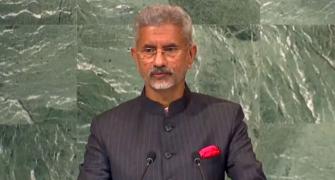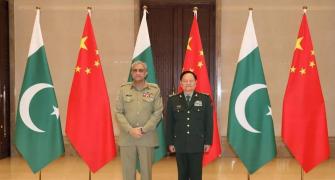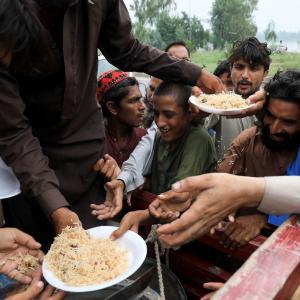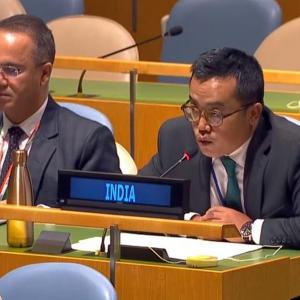There have not be much infiltration attempts along the Line of Control recently as terror groups in Pakistan have sent their cadres to carry out relief work in flood-hit Balochistan and Sindh areas, a senior army officer said on Wednesday.
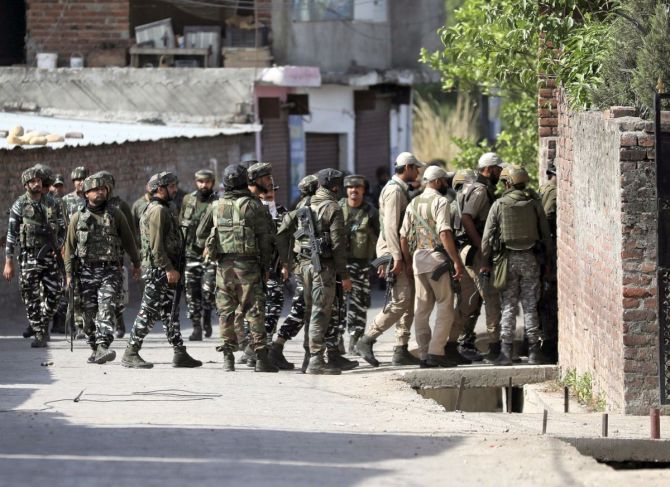
General officer Commanding 16 Corps Lieutenant General Manjinder Singh maintained that terrorists and their mentors, who try to engineer incidents in the south of Pir panchal in Jammu region, want to show to the world that entire Jammu and Kashmir is disturbed and terrorism is not restricted to Kashmir only.
"Due to these factors (flood situation in Pakistan, diversion of terrorist cadres to Balochistan and Sindh, FATF pressure on Pakistan and ongoing United Nations general assembly session), during past few days, there was not much effort (to carry out infiltrations)," he told reporters on the sidelines of a function in Jammu's Nagrota.
He said the day this situation changes, the other side will again try to carry out infiltrations along LoC.
Explaining this current situation on the border, the army officer, who was replying to a question about whether there was increase in infiltration attempts along the LoC ahead of winters, said that the current situation in Pakistan has to be analysed in three to four factors.
"There are floods. Large number of leaders try to portray militant groups in a good way. A number of militant groups have sent their elements to Balochistan and Sindh for helping people affected by floods," Lt Gen Singh said.
He also said pressure of FATF on Pakistan besides the ongoing session of the UN general assembly are other factors.
"We are alive to the situation. We assure you our grid is effective. No infiltration was being allowed for the past two years and we will ensure that there is no infiltration in our area," he said.
Lt Gen Singh, however, said that Pakistan, the ISI and its deep state will try to carry out infiltrations.
"We will foil them. They do any thing, we will not allow them to succeed in their designs," he asserted.
Replying to another question about violence, he said it has gone down.
He also said there is no recruitment of terrorists in Jammu region.
Lt Gen Singh praised the role of village defence committees and said these have been given a face-lift to enable them to become more strong to deal with such elements.
"So far, the violence in Jammu is significantly low. We have a strong anti-infiltration grid and we are concentrating on securing the hinterlands for which we have a strong anti-terror grid," he said.
"We have seen no support (for terrorists) from the population and this is a healthy sign for us. We want to encash on it," he added.
To save the youth of Jammu and Kashmir from getting radicalised, Lt Gen Singh said that a 'whole of nation' approach is needed.
He said it is the government's agenda to get youngsters into the mainstream and the Army is aligned with it to ensure peace and development in Jammu and Kashmir.
"Radicalisation is a phenomenon under which the enemy country is making efforts to dislodge youth (of Jammu and Kashmir) from the right path and take them on the wrong path. To save them (from getting radicalised), we need a whole of nation approach," the GoC of the Jammu-based White Knight Corps said.
To get youngsters into the mainstream is the agenda of the government and the Army is aligned with it to ensure peace and development in Jammu and Kashmir, Lt Gen Singh said while replying to questions about "growing radicalisation" among the youth.
Lt Gen Singh said the whole of nation approach involves participation of family, society, religious leaders, and teachers to prevent the youth from getting radicalised.
The Army is helping them, he asserted.
Lt Gen Singh said the Army identifies "hostile" profiles on social media and offers counselling to their owners.
"We remain active on this front on social media. In joint efforts with police, we identify hostile profiles and undertake counselling of several of them," he said.
The radicalised youths are booked as overground workers (OGWs) of terrorist organisations and dealt accordingly, he added.
The GoC said, "To get the youth into the mainstream is the agenda of the government and the Army is aligned to it, because it will take the youth on the path of development and peace. The enemy will not succeed in its agenda".
He said the Army organises educational, sports and cultural initiatives to provide opportunities to the youth so that they do not fall into the trap of radicalisation being initiated by the adversary through social media campaigns.
Attacking Pakistan, he said the country launched the "thousand cuts" plan to disturb peace in Jammu and Kashmir in the 1990s.
"They wanted to bleed India through a thousand cuts but the troops of the White Knight Corps stood up against it. Today, we see peace progress and development in Jammu region. One thousand terrorists have been killed in the region since then," he said.
Replying to another question about the challenges that the Army is facing, he said, narcotics are being smuggled from across the border in addition to weapons and infiltration bids.
The Army is capable to stop it and has a surveillance grid, fencing and soldiers performing 24-hour duties so that the enemy is not able to infiltrate, he said.
The second challenge is the enemy using vulnerable points on the LoC for infiltration, he said.
"Pakistan is trying to infiltrate terrorists, and smuggle ammunition and narcotics. But we have a counter-terrorism grid to ensure the terrorists are eliminated," he said, adding that it was a "good thing" that the people of the south of Pirpanchal were "anti-militants".
On the issue of use of drones by Pakistan to drop weapons and narcotics, he said the phenomenon is more common in Punjab.
"There is less sighting of drones in our (White Knight Corps) areas and we suspect the ones seen here are a reconnaissance by the enemy, hence we are soon getting an anti-drone mechanism," he said.
"We have our plans. Equipment is coming in order to foil drone threats," he said.


